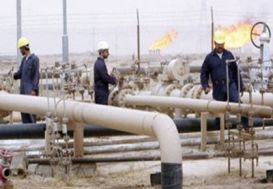Iraq’s oil production exceeds Iran’s for 1st time since 1980s


Baghdad (IraqiNews.com) Iraq has overtaken Iran as the second-largest OPEC oil producer for the first time since the late 1980s, a symbolic shift that signals the huge impact of Westren Sanctions on Tehran and the steady recovery of Baghdad’s energy industry.
A report by the Washington Post quoted the International Energy Agency, as confirming that “Iraq last month produced more than 3 million barrels a day, the highest output since the U.S.-led invasion nearly a decade ago. At the same time, Iranian oil output fell below the 3 million-barrel-a-day level for the first time in more than 20 years, dropping to 2.9 million a day in July.”
The report added “Industry executives, analysts and policymakers said that although Iraq had made strong progress boosting its output, the drop in Iranian production was the main factor behind the switch in the production ranking.”
The report continued “The gap is likely to widen as Iraq continues to rebuild its hydrocarbon industry with the help of billion of dollars in investments from foreign oil companies and Iran faces further Western sanctions over its nuclear program.”
“Baghdad signed long-term contracts between late 2008 and early 2010 with oil groups including Exxon Mobil, Royal Dutch Shell, BP, Total of France, Lukoil of Russia and CNPC of China to develop a dozen gigantic fields in southern Iraq, including some of the world’s largest, such as Rumaila and West Qurna,” the report remarked.
Iraq has set an ambitious target of pumping 12 million barrels a day by 2017, but officials and industry executives have said they believe it will achieve only a fraction of that level.
The recovery of Iraqi oil production has slowed in the past two years, partly because of infrastructure bottlenecks, such as the lack of sufficient pipeline capacity and export terminals to ship the oil from the fields to supertankers in the Gulf. Earlier this year, Iraq installed new pipelines and opened two terminals that have nearly doubled its export capacity in the south to 3 million barrels a day.
Iraq is still faces enormous security and political challenges. Only this month, two bombs damaged a critical pipeline carrying crude oil from the northern city of Kirkuk to the Turkish port of Ceyhan in the Mediterranean. International oil companies remain wary of sending foreign workers to Iraq.
